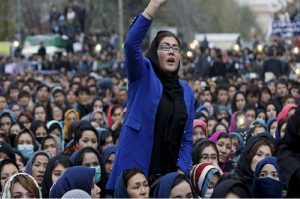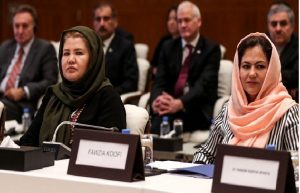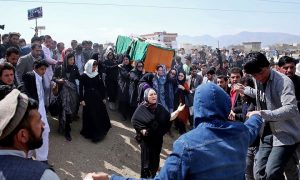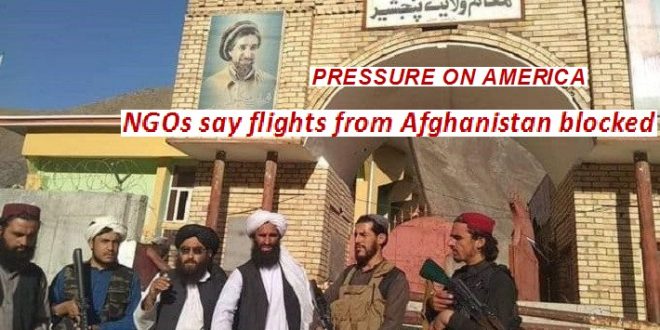07-09-2021
By SJA Jafri + Bureau Report + Agencies
 KABUL/ ISLAMABAD/ WASHINGTON: The Taliban has taken complete control of Panjshir province, the last area in Afghanistan held by resistance forces, the group’s spokesman said, as it cemented its control of the country three weeks after taking over Kabul.
KABUL/ ISLAMABAD/ WASHINGTON: The Taliban has taken complete control of Panjshir province, the last area in Afghanistan held by resistance forces, the group’s spokesman said, as it cemented its control of the country three weeks after taking over Kabul.
“With this victory, our country is completely taken out of the quagmire of war,” chief spokesman Zabihullah Mujahid said on Monday.
Pictures on social media showed Taliban members standing in front of the gate of the Panjshir provincial governor’s compound.
Meanwhile, the National Resistance Front (NRF) spokesman said the Taliban’s claim of victory was false and opposition forces continued to fight, adding that its forces were present in “strategic positions” across the Panjshir valley.
The whereabouts of resistance leader Ahmed Massoud and Amrullah Saleh, the former vice president who had joined resistance forces after the fall of Kabul, were not immediately known.
Massoud said in a Twitter message that he was safe. Saleh had declared himself acting president after President Ashraf Ghani fled the country after the Taliban takeover on August 15.
 Meanwhile, US Secretary of State Antony Blinken arrived in Qatar to discuss the chaotic aftermath of the US withdrawal from Afghanistan.
Meanwhile, US Secretary of State Antony Blinken arrived in Qatar to discuss the chaotic aftermath of the US withdrawal from Afghanistan.
The NRF includes local fighters loyal to Massoud, the son of famous anti-Soviet and anti-Taliban commander Ahmad Shah Massoud, as well as remnants of the Afghan military who retreated to the Panjshir Valley, about 125km (78 miles) north of the capital Kabul.
The group said separately in a tweet on Sunday that spokesman Fahim Dashty, a well-known Afghan journalist, and General Abdul Wudod Zara had been killed in the latest fighting.
Mujahid, the Taliban spokesman, in a press conference on Monday, said resistance forces gave “negative answers” when the Taliban tried to negotiate, adding that no civilian casualties were reported in the takeover of Panjshir.
The Panjshir Valley
The Panjshir Valley is famed for being the site of resistance to Soviet forces in the 1980s and the Taliban in the late 1990s.
The Taliban is yet to finalise its new government after rolling into Kabul three weeks ago.
 Afghanistan’s new rulers have pledged to be more “inclusive” than during their first stint in power, which also came after years of conflict, first the Soviet invasion of 1979, and then a bloody civil war. They have promised a government that represents Afghanistan’s complex ethnic makeup.
Afghanistan’s new rulers have pledged to be more “inclusive” than during their first stint in power, which also came after years of conflict, first the Soviet invasion of 1979, and then a bloody civil war. They have promised a government that represents Afghanistan’s complex ethnic makeup.
Women will be allowed to attend university as long as classes are segregated by sex or at least divided by a curtain, the Taliban’s education authority said in a lengthy document issued on Sunday.
But female students will be required to wear a long robe and face veil, as opposed to the burqa mandatory under the previous Taliban rule. Women’s freedoms in Afghanistan were sharply curtailed under the Taliban’s 1996-2001 rule.
As the Taliban comes to grips with its transition from armed uprising to government, it is facing a host of challenges, including humanitarian needs for which international assistance is critical.
UN humanitarian chief Martin Griffiths has arrived in Kabul for days of meetings with the Taliban leadership, which has promised to help.
 “The authorities pledged that the safety and security of humanitarian staff, and humanitarian access to people in need, will be guaranteed and that humanitarian workers – men and women – will be guaranteed freedom of movement,” a statement from United Nations spokesman Stephane Dujarric said.
“The authorities pledged that the safety and security of humanitarian staff, and humanitarian access to people in need, will be guaranteed and that humanitarian workers – men and women – will be guaranteed freedom of movement,” a statement from United Nations spokesman Stephane Dujarric said.
The Taliban spokesman tweeted that the group’s delegation assured the UN of cooperation.
Blinken trip to Qatar, Germany
The international community is coming to terms with the new Taliban regime with a flurry of diplomacy.
The US’s top diplomat, Blinken, arrived on Monday in Qatar, a key player in Afghanistan. He was later joined by US Secretary of Defence Lloyd Austin in the Gulf country.
The officials met with the Qatari Emir, Sheikh Tamim bin Hamad al-Thani, and discussed developments in Afghanistan and efforts to enhance security there, the emir’s court said on Monday.
Qatar, which hosts a US military base, has been the gateway for 55,000 people airlifted out of Afghanistan, nearly half the total evacuated by US-led forces since the Taliban began their takeover.
 The US State Department said Blinken thanked Doha for its “extraordinary support” in the evacuations from Kabul. Blinken, Austin and the Qatari emir “also discussed other important bilateral issues and initiatives to promote regional security and prosperity”, the department said in a statement on Monday evening.
The US State Department said Blinken thanked Doha for its “extraordinary support” in the evacuations from Kabul. Blinken, Austin and the Qatari emir “also discussed other important bilateral issues and initiatives to promote regional security and prosperity”, the department said in a statement on Monday evening.
Blinken on Wednesday is expected to head to the US airbase in Ramstein, Germany, a temporary home for thousands of Afghans moving to the US, from which he will hold a virtual 20-nation ministerial meeting on the crisis alongside German Foreign Minister Heiko Maas.
German Chancellor Angela Merkel on Sunday called for dialogue with the Taliban.
“We simply have to talk to the Taliban about how we can get people who have worked for Germany out of the country and bring them to safety,” she told reporters.
Meanwhile, President Joe Biden’s administration faced mounting pressure Monday amid reports that several hundred people, including Americans, had been prevented for a week from flying out of an airport in northern Afghanistan.
 Marina LeGree, the founder and executive director of a small American non-governmental organization active in Afghanistan, said some 600 to 1,300 people, including girls from her group, had been waiting near the Mazar-i-Sharif airport for as long as a week, amid confusion involving the Taliban and US officials.
Marina LeGree, the founder and executive director of a small American non-governmental organization active in Afghanistan, said some 600 to 1,300 people, including girls from her group, had been waiting near the Mazar-i-Sharif airport for as long as a week, amid confusion involving the Taliban and US officials.
That number is understood to include 19 Americans, though none are with LeGree’s group. Those waiting are being housed in various places in the city, she said.
“It’s been seven days and nothing’s moving,” LeGree told AFP, adding that six chartered planes were waiting at the airport to evacuate what some officials are calling “the NGO group.”
“The Taliban are simply not letting anything move.”
Her Virginia-based organization, which trains Afghan girls in leadership through physical activities like mountain climbing, is trying to evacuate a small group of girls and young women, all aged 16 to 23, and a few family members.
All are Hazara, an ethnic minority in Afghanistan that faced severe repression when the Taliban last controlled the country from 1996-2001.
 LeGree, who has worked in Afghanistan since 2005 for aid groups and US agencies, expressed frustration with the role of the State Department in clearing the flights.
LeGree, who has worked in Afghanistan since 2005 for aid groups and US agencies, expressed frustration with the role of the State Department in clearing the flights.
The group’s departure had seemed imminent until a few days ago, when planning suddenly stopped.
– ‘Constraints’ –
A State Department spokesperson said Monday that while the US is committed to helping Americans and at-risk Afghans to leave, its resources in Afghanistan are seriously limited.
“We do not have personnel on the ground, we do not have air assets in the country, we do not control the airspace — whether over Afghanistan or elsewhere in the region,” the spokesperson told AFP.
“Given these constraints, we also do not have a reliable means to confirm the basic details of charter flights, including who may be organizing them, the number of US citizens and other priority groups on board, the accuracy of the rest of the manifest, and where they plan to land.”
The spokesperson added: “We will hold the Taliban to its pledge to let people freely depart Afghanistan.”
 Satellite images of the airport from September 3 show six airplanes, one on a runway and others outside terminal buildings.
Satellite images of the airport from September 3 show six airplanes, one on a runway and others outside terminal buildings.
Biden’s Republican opposition has seized on the situation, which comes at a time when his popularity has fallen sharply amid concerns about the Afghanistan evacuation and the summer’s surge in Covid-19 cases.
Michael McCaul, the top Republican on the House Foreign Affairs Committee, suggested Sunday the Taliban was holding the group as part of high-pressure negotiations with Washington.
The affair, he said on Fox News, was “turning into a hostage situation where they’re not going to allow American citizens to leave until they get full recognition from the United States.”
But LeGree said she would not characterize the situation that way.
“Nobody is guarding the door,” she said, even if her concern has grown as the days pass.
“If it isn’t resolved very soon, we’re worried for the physical safety of our girls,” she said.
A Democratic US senator, Richard Blumenthal, also expressed impatience.
“For days, my staff and I have been focused on getting these planes off the ground… Delays are not only frustrating, they are inexcusable,” he said in a statement.
“It is imperative that the State Department now do everything in its power to facilitate these planes’ safe arrival at our airbase in Doha, where they are cleared to land,” he added.
Eric Montalvo, a former US Marine Corps officer and a lawyer working with groups that chartered two of the six planes, was more blunt.
“The Taliban is not holding these planes hostage,” he said in a statement to AFP.
“The problem is the US government. All the State Department has to do is make a phone call and these people will be able to leave immediately.”
The US completed its military withdrawal from Afghanistan on August 31 after weeks of chaos, following the Taliban’s stunningly rapid takeover of the country.
More than 120,000 people were flown out of Afghanistan in one of the largest such aerial operations in history, though US officials acknowledged having left a few hundred Americans behind, along with many vulnerable Afghans.
The Biden administration has repeatedly vowed to do everything possible to help those who want to leave.
On Monday, the State Department announced that four American citizens had been able to leave Afghanistan by road, arriving in an unnamed neighbouring country without any resistance from the Taliban.
They were the first officially acknowledged US departures since August 31.
 Pressmediaofindia
Pressmediaofindia





